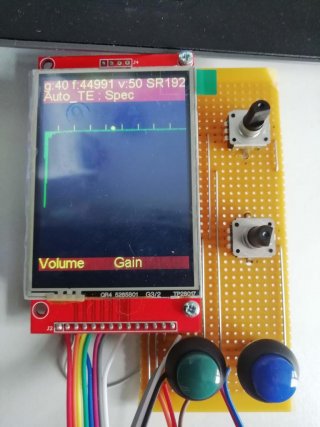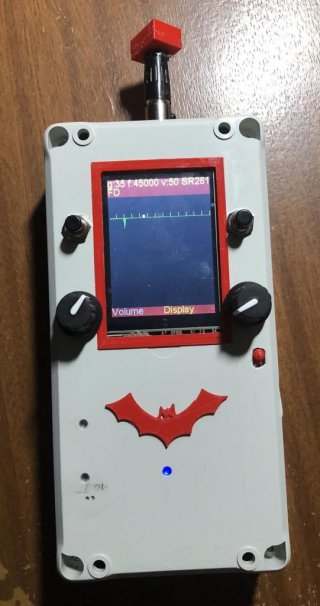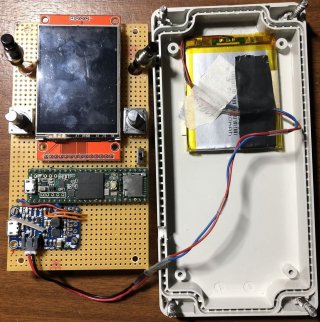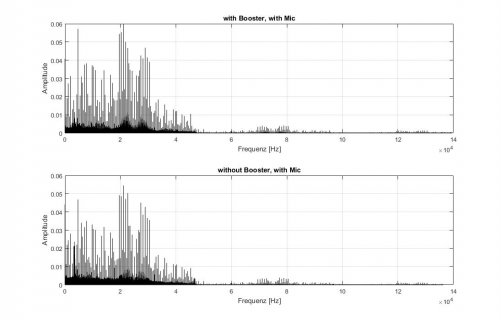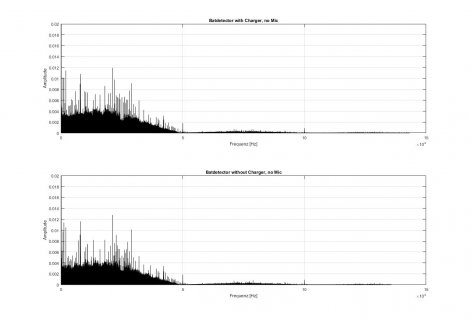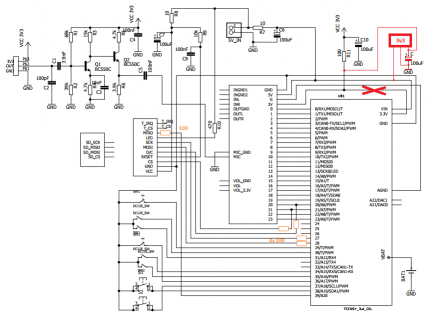/***********************************************************************
* TEENSY 3.6 BAT DETECTOR V0.1 20180814
*
* Copyright (c) 2018, Cor Berrevoets, registax@gmail.com
*
* TODO: use selectable presets
*
* HARDWARE USED:
* TEENSY 3.6
* TEENSY audio board
* Ultrasonic microphone with seperate preamplifier connected to mic/gnd on audioboard
* eg. Knowles MEMS SPU0410LR5H-QB
* TFT based on ILI9341
* 2 rotary encoders with pushbutton
* 2 pushbuttons
* SDCard
*
* IMPORTANT: uses the SD card slot of the Teensy, NOT the SD card slot of the audio board
*
* 4 operational modes: Heterodyne.
* Frequency divider
* Automatic heterodyne (1/10 implemented)
* Automatic TimeExpansion (live)
*
* Sample rates up to 352k
*
* User controlled parameters:
* Volume
* Gain
* Frequency
* Display (none, spectrum, waterfall)
* Samplerate
*
* Record raw data
* Play raw data (user selectable) on the SDcard using time_expansion (8, 11, 16,22,32,44k samplerate )
*
*
* Fixes compared to original base:
* - issue during recording due to not refilling part of the buffer (was repeating the original first 256 samples )
* - filenames have samplerate stored
* - RTC added (based on hardware)
*
* **********************************************************************
* Based on code by DD4WH
*
* https://forum.pjrc.com/threads/38988-Bat-detector
*
* https://github.com/DD4WH/Teensy-Bat-Detector
*
* made possible by the samplerate code by Frank Boesing, thanks Frank!
* Audio sample rate code - function setI2SFreq
* Copyright (c) 2016, Frank Bösing, f.boesing@gmx.de
*
* Permission is hereby granted, free of charge, to any person obtaining a copy
* of this software and associated documentation files (the "Software"), to deal
* in the Software without restriction, including without limitation the rights
* to use, copy, modify, merge, publish, distribute, sublicense, and/or sell
* copies of the Software, and to permit persons to whom the Software is
* furnished to do so, subject to the following conditions:
*
* The above copyright notice, development funding notice, and this permission
* notice shall be included in all copies or substantial portions of the Software.
*
* THE SOFTWARE IS PROVIDED "AS IS", WITHOUT WARRANTY OF ANY KIND, EXPRESS OR
* IMPLIED, INCLUDING BUT NOT LIMITED TO THE WARRANTIES OF MERCHANTABILITY,
* FITNESS FOR A PARTICULAR PURPOSE AND NONINFRINGEMENT. IN NO EVENT SHALL THE
* AUTHORS OR COPYRIGHT HOLDERS BE LIABLE FOR ANY CLAIM, DAMAGES OR OTHER
* LIABILITY, WHETHER IN AN ACTION OF CONTRACT, TORT OR OTHERWISE, ARISING FROM,
* OUT OF OR IN CONNECTION WITH THE SOFTWARE OR THE USE OR OTHER DEALINGS IN
* THE SOFTWARE.
*
**********************************************************************/
/* CORBEE */
/* TEENSY 3.6 PINSETUP (20180814)
GND Vin - PREAMP V+
0 Analog GND
1 3.3V - MEMS MIC
2 23 AUDIO -LRCLK
3 22 AUDIO -TX
4 21 TFT CS
5 20 TFT DC
AUDIO MEMCS 6 19 AUDIO - SCL
AUDIO MOSI 7 18 AUDIO - SDA
8 17
AUDIO BCLK 9 16
AUDIO SDCS 10 15 AUDIO -VOL
AUDIO MCLK 11 14 AUDIO -SCLK
AUDIO MISO 12 13 AUDIO -RX
3.3V GND
24 A22
25 A21
26 39 TFT MISO
TFT SCLK 27 38 MICROPUSH_L
TFT MOSI 28 37 MICROPUSH_R
ENC_L-BUTTON 29 36 ENC_R-BUTTON
ENC_L A 30 35 ENC_R A
ENC_L B 31 34 ENC_R B
32 33
*/
//#define DEBUG
#define USETFT
//SD1 uses default SDcard Fat, TODO !! SD2 uses faster SDIO library
#define USESD1
#ifdef USESD1
#define USESD
#include <SD.h>
#include "ff.h" // uSDFS lib
#include "ff_utils.h" // uSDFS lib
File root;
FRESULT rc; /* Result code */
FATFS fatfs; /* File system object */
FIL fil; /* File object */
#endif
// TODO: try and see if using the SdFs library is able to write faster
// started setup and included several #ifdefs inside the audio-library SDrelated files (play_raw play_wav)
#ifdef USESD2
#define USESD
//#include "SdFs.h"
#include "logger_setup.h"
#endif
//default SD related
#ifdef USESD
#define MAX_FILES 50
#define MAX_FILE_LENGTH 13 // 8 chars plus 4 for.RAW plus NULL
char filelist[ MAX_FILES ][ MAX_FILE_LENGTH ];
int filecounter=0;
int fileselect=0;
int referencefile=0;
//File frec; // audio is recorded to this file first
int file_number = 0;
#endif
// Workaround for problems with Time.h/Timelib.h used in the code by "corber"
#include <Time.h> This just seems to include Timelib.h so in the two lines below we use Timelib
//#include <C:\Program Files (x86)\Arduino\hardware\teensy\avr\libraries\Time\TimeLib.h> // compile in two steps by first using this line and wae for exit error.
//#include <TimeLib.h> //After first compile error we uncomment this line and comment out the line above an compile again.
#include "Audio.h"
//#include <Wire.h>
#include <SPI.h>
#include <Bounce.h>
//#include <Metro.h>
boolean SD_ACTIVE=false;
boolean continousPlay=false;
boolean batTrigger=false;//triggers when an ultrasonic signalpeak is found during FFT
boolean TE_ready=true; //when a TEcall is played this signals the end of the call
time_t getTeensy3Time()
{
return Teensy3Clock.get();
}
int helpmin; // definitions for time and date adjust - Menu
int helphour;
int helpday;
int helpmonth;
int helpyear;
int helpsec;
uint8_t hour10_old;
uint8_t hour1_old;
uint8_t minute10_old;
uint8_t minute1_old;
uint8_t second10_old;
uint8_t second1_old;
bool timeflag = 0;
uint32_t lastmillis;
#ifdef USETFT
#define ILI9341
#ifdef ILI9341
#include "ILI9341_t3.h"
#include "font_Arial.h"
#define BACKLIGHT_PIN 255
#define TOP_OFFSET 90
#define BOTTOM_OFFSET 20
#define TFT_DC 20
#define TFT_CS 21
#define TFT_RST 255 // 255 = unused. connect to 3.3V
#define TFT_MOSI 28
#define TFT_SCLK 27
#define TFT_MISO 39
//#define Touch_CS 8
ILI9341_t3 tft = ILI9341_t3(TFT_CS, TFT_DC, TFT_RST, TFT_MOSI, TFT_SCLK, TFT_MISO);
//XPT2046_Touchscreen ts = XPT2046_Touchscreen(Touch_CS);
//predefine menu background etc colors
#define ENC_MENU_COLOR COLOR_YELLOW
#define ENC_VALUE_COLOR COLOR_LIGHTGREY
#define MENU_BCK_COLOR COLOR_DARKRED
#endif
#endif
// this audio comes from the codec by I2S2
AudioInputI2S i2s_in; // MIC input
AudioRecordQueue recorder;
AudioSynthWaveformSineHires sine1; // local oscillator
//AudioSynthWaveformSineHires sine2; // local oscillator
//
AudioEffectMultiply heterodyne_multiplier; // multiply = mix
//AudioEffectMultiply mult2; // multiply = mix
//AudioAnalyzeFFT1024 fft1024_1; // for waterfall display
AudioAnalyzeFFT256 myFFT; // for spectrum display
AudioPlaySdRaw player;
AudioEffectGranular granular1;
AudioMixer4 mixFFT;
AudioMixer4 outputMixer; //selective output
AudioMixer4 inputMixer; //selective input
AudioOutputI2S i2s_out; // headphone output
AudioConnection mic_toinput (i2s_in, 0, inputMixer, 0); //microphone signal
AudioConnection mic_torecorder (i2s_in, 0, recorder, 0); //microphone signal
//AudioConnection mic_topeak (i2s_in, peakRMS);
//AudioConnection mic_topeak1 (i2s_in, peakVal);
AudioConnection player_toinput (player, 0, inputMixer, 1); //player signal
AudioConnection input_toswitch (inputMixer,0, mixFFT,0);
AudioConnection input_todelay (inputMixer,0, granular1, 0);
AudioConnection switch_toFFT (mixFFT,0, myFFT,0 ); //raw recording channel
AudioConnection input_toheterodyne1 (inputMixer, 0, heterodyne_multiplier, 0); //heterodyne 1 signal
AudioConnection sineheterodyne1 (sine1, 0, heterodyne_multiplier, 1);//heterodyne 1 mixerfreq
AudioConnection granular_toout (granular1,0, outputMixer,1);
//AudioConnection input_toheterodyne2 (granular1, 0, mult2, 0); //heterodyne 2
//AudioConnection sineheterodyne2 (sine2, 0, mult2, 1);//heterodyne 2 mixerfreq
AudioConnection heterodyne1_toout (heterodyne_multiplier, 0, outputMixer, 0); //heterodyne 1 output to outputmixer
//AudioConnection heterodyne2_toout (mult2, 0, outputMixer, 1); //heterodyne 2 output to outputmixer
AudioConnection player_toout (inputMixer,0, outputMixer, 2); //direct signal (use with player) to outputmixer
AudioConnection output_toheadphoneleft (outputMixer, 0, i2s_out, 0); // output to headphone
AudioConnection output_toheadphoneright (outputMixer, 0, i2s_out, 1);
//AudioConnection granular_toheadphone (granular1,0,i2s_out,1);
AudioControlSGTL5000 sgtl5000;
//const int myInput = AUDIO_INPUT_LINEIN;
const int myInput = AUDIO_INPUT_MIC;
#define GRANULAR_MEMORY_SIZE 30000 // enough for 100 ms at 281kHz
int16_t granularMemory[GRANULAR_MEMORY_SIZE];
// forward declaration Stop recording with message
#ifdef DEBUGSERIAL
void die(char *str, FRESULT rc);
#endif
extern "C" uint32_t usd_getError(void);
struct tm seconds2tm(uint32_t tt);
//continous timers
elapsedMillis since_bat_detection1; //start timing directly after FFT detects an ultrasound
elapsedMillis since_bat_detection2; //start timing directly after FFT detects the end of the ultrasound
//
elapsedMillis since_heterodyne=1000; //timing interval for auto_heterodyne frequency adjustments
uint16_t callLength=0;
//uint16_t clicker=0;
/************** RECORDING PLAYING SETTINGS *****************/
const int8_t MODE_DETECT = 0;
const int8_t MODE_REC = 1;
const int8_t MODE_PLAY = 2;
int mode = MODE_DETECT;
#if defined(__MK20DX256__)
#define BUFFSIZE (8*1024) // size of buffer to be written
#elif defined(__MK66FX1M0__)
#define BUFF 64
#define BUFFSIZE (BUFF*1024) // size of buffer to be written
#endif
// buffer to store audiosamples during recording
uint8_t buffern[BUFFSIZE] __attribute__( ( aligned ( 16 ) ) );
//uint8_t buffern2[BUFFSIZE] __attribute__( ( aligned ( 16 ) ) );
uint wr;
uint32_t nj = 0;
#define waterfallgraph 1
#define spectrumgraph 2
int idx_t = 0;
int idx = 0;
int64_t sum;
float32_t mean;
int16_t FFT_bin [128];
int16_t FFT_max1 = 0;
uint32_t FFT_max_bin1 = 0;
int16_t FFT_mean1 = 0;
int16_t FFT_max2 = 0;
uint32_t FFT_max_bin2 = 0;
int16_t FFT_mean2 = 0;
//int16_t FFT_threshold = 0;
int16_t FFT_bat [3]; // max of 3 frequencies are being displayed
int16_t index_FFT;
int l_limit;
int u_limit;
int index_l_limit;
int index_u_limit;
//const uint16_t FFT_points = 1024;
const uint16_t FFT_points = 256;
int barm [512];
#define SAMPLE_RATE_MIN 0
#define SAMPLE_RATE_8K 0
#define SAMPLE_RATE_11K 1
#define SAMPLE_RATE_16K 2
#define SAMPLE_RATE_22K 3
#define SAMPLE_RATE_32K 4
#define SAMPLE_RATE_44K 5
#define SAMPLE_RATE_48K 6
#define SAMPLE_RATE_88K 7
#define SAMPLE_RATE_96K 8
#define SAMPLE_RATE_176K 9
#define SAMPLE_RATE_192K 10
#define SAMPLE_RATE_234K 11
#define SAMPLE_RATE_281K 12
#define SAMPLE_RATE_352K 13
#define SAMPLE_RATE_MAX 13
typedef struct SR_Descriptor
{
const int SR_n;
const char* const txt; //display
} SR_Desc;
// SRtext and position for the FFT spectrum display scale
const SR_Descriptor SR [SAMPLE_RATE_MAX + 1] =
{
// SR_n , f1
{ SAMPLE_RATE_8K, "8"},
{ SAMPLE_RATE_11K, "11"},
{ SAMPLE_RATE_16K, "16"},
{ SAMPLE_RATE_22K, "22"},
{ SAMPLE_RATE_32K, "32"},
{ SAMPLE_RATE_44K, "44"},
{ SAMPLE_RATE_48K, "48"},
{ SAMPLE_RATE_88K, "88"},
{ SAMPLE_RATE_96K, "96"},
{ SAMPLE_RATE_176K, "176"},
{ SAMPLE_RATE_192K, "192"},
{ SAMPLE_RATE_234K, "234"},
{ SAMPLE_RATE_281K, "281"},
{ SAMPLE_RATE_352K, "352"}
};
// setup for FFTgraph denoising
uint32_t FFTcount=0; //count the # of FFTs done
uint16_t powerspectrumCounter=0;
float FFTavg[128];
float FFTpowerspectrum[128];
float powerspectrum_Max=0;
// defaults at startup functions
int displaychoice=waterfallgraph; //default display
int8_t mic_gain = 35; // start detecting with this MIC_GAIN in dB
int8_t volume=50;
int freq_real = 45000; // start heterodyne detecting at this frequency
int freq_real_backup=freq_real; //used to return to proper settingafter using the play_function
// initial sampling setup
int sample_rate = SAMPLE_RATE_281K;
int sample_rate_real = 281000;
char * SRtext="281";
int last_sample_rate=sample_rate;
float freq_Oscillator =50000;
/************************************************* MENU ********************************/
/***************************************************************************************/
typedef struct Menu_Descriptor
{
const char* name;
// ********preset variables below NOT USED YET
const int len; // length of string to allow right-alignment
const int def; //default settings
const int low; // low threshold
const int high; //high threshold
} Menu_Desc;
const int Leftchoices=10; //can have any value
const int Rightchoices=10;
const Menu_Descriptor MenuEntry [Leftchoices] =
{ {"Volume",6,60,0,100}, //divide by 100
{"Gain",4,30,0,63},
{"Frequency",9,45,20,90}, //multiply 1000
{"Display",7,0,0,0},
{"Denoise",7,0,0,0},
{"SampleR",6,0,0,0},
{"Record",6,0,0,0}, //functions where the LeftEncoder
{"Play",4,0,0,0},
{"PlayD",5,0,0,0},
} ;
//TODO constants should be part of the menuentry, a single structure to hold the info
const int8_t MENU_VOL = 0; //volume
const int8_t MENU_MIC = 1; //mic_gain
const int8_t MENU_FRQ = 2; //frequency
const int8_t MENU_DSP = 3; //display
const int8_t MENU_DNS = 4; //denoise
const int8_t MENU_SR = 5; //sample rate
const int8_t MENU_REC = 6; //record
const int8_t MENU_PLY = 7; //play
const int8_t MENU_PLD = 8; //play at original rate
//available modes
const int detector_heterodyne=0;
const int detector_divider=1;
const int detector_Auto_heterodyne=2;
const int detector_Auto_TE=3;
const int detector_passive=4;
//default
int detector_mode=detector_heterodyne;
//************************* ENCODER variables/constants
const int8_t enc_menu=0; //changing encoder sets menuchoice
const int8_t enc_value=1; //changing encoder sets value for a menuchoice
const int8_t enc_leftside=0; //encoder
const int8_t enc_rightside=1; //encoder
const int8_t enc_up=1; //encoder goes up
const int8_t enc_nc=0;
const int8_t enc_dn=-1; //encoder goes down
int EncLeft_menu_idx=0;
int EncRight_menu_idx=0;
int EncLeft_function=0;
int EncRight_function=0;
/************************** */
// ******** LEFT AND RIGHT ENCODER CONNECTIONS/BUTTONS
#include <Encoder.h>
//try to avoid interrupts as they can (possibly ?) interfere during recording
#define ENCODER_DO_NOT_USE_INTERRUPTS
#define MICROPUSH_RIGHT 37
Bounce micropushButton_R = Bounce(MICROPUSH_RIGHT, 50);
#define encoderButton_RIGHT 36
Bounce encoderButton_R = Bounce(encoderButton_RIGHT, 50);
Encoder EncRight(34,35);
int EncRightPos=0;
int EncRightchange=0;
#define MICROPUSH_LEFT 38
Bounce micropushButton_L = Bounce(MICROPUSH_LEFT, 50);
#define encoderButton_LEFT 29
Bounce encoderButton_L = Bounce(encoderButton_LEFT, 50);
Encoder EncLeft(30,31);
int EncLeftPos=0;
int EncLeftchange=0;
// **END************ LEFT AND RIGHT ENCODER DEFINITIONS
#ifdef USESD1
void die(char *str, FRESULT rc)
{
#ifdef DEBUGSERIAL
Serial.printf("%s: Failed with rc=%u.\n", str, rc); for (;;) delay(100);
#endif
}
//=========================================================================
#endif
#ifdef USESD1
//uint32_t count=0;
uint32_t ifn=0;
uint32_t isFileOpen=0;
TCHAR wfilename[80];
uint32_t t0=0;
uint32_t t1=0;
#endif
char filename[80];
void display_settings() {
#ifdef USETFT
tft.setTextColor(ENC_MENU_COLOR);
tft.setFont(Arial_16);
tft.fillRect(0,0,240,TOP_OFFSET-50,MENU_BCK_COLOR);
tft.fillRect(0,TOP_OFFSET-10,240,10,COLOR_BLACK);
tft.fillRect(0,ILI9341_TFTHEIGHT-BOTTOM_OFFSET,240,BOTTOM_OFFSET,MENU_BCK_COLOR);
tft.setCursor(0,0);
tft.print("g:"); tft.print(mic_gain);
tft.print(" f:"); tft.print(freq_real);
tft.print(" v:"); tft.print(volume);
tft.print(" SR"); tft.print(SRtext);
tft.setCursor(0,20);
switch (detector_mode) {
case detector_heterodyne:
tft.print("HTD"); //
break;
case detector_divider:
tft.print("FD");
break;
case detector_Auto_heterodyne:
tft.print("Auto_HTD");
break;
case detector_Auto_TE:
tft.print("Auto_TE");
break;
case detector_passive:
tft.print("PASS");
break;
default:
tft.print("error");
}
// push the cursor to the lower part of the screen
tft.setCursor(0,ILI9341_TFTHEIGHT-BOTTOM_OFFSET);
/****************** SHOW ENCODER SETTING ***********************/
// set the colors according to the function of the encoders
if (mode==MODE_DETECT )
// show menu selection as menu-active of value-active
{
if (EncLeft_function==enc_value)
{ tft.setTextColor(ENC_MENU_COLOR);
}
else
{ tft.setTextColor(ENC_VALUE_COLOR);}
tft.print(MenuEntry[EncLeft_menu_idx].name);
tft.print(" ");
if (EncRight_function==enc_value)
{ tft.setTextColor(ENC_MENU_COLOR);} //value is active
else
{ tft.setTextColor(ENC_VALUE_COLOR);} //menu is active
//if MENU on the left-side is PLAY and selected than show the filename
if ((EncLeft_menu_idx==MENU_PLY) and (EncLeft_function==enc_value))
{ //tft.print(fileselect);
tft.print(filelist[fileselect]);
}
else
if (EncLeft_menu_idx==MENU_REC)
// show the filename that will be used for the next recording
{ sprintf(filename, "B%u_%s.raw", file_number+1,SRtext);
tft.print(filename );
}
else
if (EncLeft_menu_idx==MENU_SR)
{ tft.print(SR[sample_rate].txt);
}
else
{ //tft.print(EncRightchange);
tft.setCursor(ILI9341_TFTWIDTH/2 ,ILI9341_TFTHEIGHT-BOTTOM_OFFSET);
tft.print(MenuEntry[EncRight_menu_idx].name);
}
}
else
{
if (mode==MODE_REC)
{ tft.setTextColor(ENC_VALUE_COLOR);
tft.print("REC:");
tft.print(filename);
}
if (mode==MODE_PLAY)
{if (EncLeft_menu_idx==MENU_PLY)
{ tft.setTextColor(ENC_VALUE_COLOR);
tft.print("PLAY:");
tft.print(filename);
}
else
{tft.setTextColor(ENC_VALUE_COLOR);
tft.print(MenuEntry[EncLeft_menu_idx].name);
tft.print(" ");
tft.print(MenuEntry[EncRight_menu_idx].name);
}
}
}
//scale every 10kHz
float x_factor=10000/(0.5*(sample_rate_real / FFT_points));
int curF=2*int(freq_real/(sample_rate_real / FFT_points));
int maxScale=int(sample_rate_real/20000);
for (int i=1; i<maxScale; i++)
{ tft.drawFastVLine(i*x_factor, TOP_OFFSET-10, 9, ENC_MENU_COLOR);
}
tft.fillCircle(curF,TOP_OFFSET-4,3,ENC_MENU_COLOR);
#endif
}
void set_mic_gain(int8_t gain) {
AudioNoInterrupts();
//sgtl5000.micGainNew (24);
sgtl5000.micGain (gain);
//sgtl5000.lineInLevel(gain/4);
AudioInterrupts();
display_settings();
powerspectrum_Max=0; // change the powerspectrum_Max for the FFTpowerspectrum
} // end function set_mic_gain
void set_freq_Oscillator(int freq) {
// audio lib thinks we are still in 44118sps sample rate
// therefore we have to scale the frequency of the local oscillator
// in accordance with the REAL sample rate
freq_Oscillator = (freq) * (AUDIO_SAMPLE_RATE_EXACT / sample_rate_real);
//float F_LO2= (freq+5000) * (AUDIO_SAMPLE_RATE_EXACT / sample_rate_real);
// if we switch to LOWER samples rates, make sure the running LO
// frequency is allowed ( < 22k) ! If not, adjust consequently, so that
// LO freq never goes up 22k, also adjust the variable freq_real
if(freq_Oscillator > 22000) {
freq_Oscillator = 22000;
freq_real = freq_Oscillator * (sample_rate_real / AUDIO_SAMPLE_RATE_EXACT) + 9;
}
AudioNoInterrupts();
//setup multiplier SINE
sine1.frequency(freq_Oscillator);
//sine2.frequency(freq_Oscillator);
AudioInterrupts();
display_settings();
} // END of function set_freq_Oscillator
// set samplerate code by Frank Boesing
void setI2SFreq(int freq) {
typedef struct {
uint8_t mult;
uint16_t div;
} tmclk;
//MCLD Divide sets the MCLK divide ratio such that: MCLK output = MCLK input * ( (FRACT + 1) / (DIVIDE + 1) ).
// FRACT must be set equal or less than the value in the DIVIDE field.
//(double)F_PLL * (double)clkArr[iFreq].mult / (256.0 * (double)clkArr[iFreq].div);
//ex 180000000* 1 /(256* 3 )=234375Hz setting {1,3} at 180Mhz
#if (F_PLL==16000000)
const tmclk clkArr[numfreqs] = {{16, 125}, {148, 839}, {32, 125}, {145, 411}, {64, 125}, {151, 214}, {12, 17}, {96, 125}, {151, 107}, {24, 17}, {192, 125}, {127, 45}, {48, 17}, {255, 83} };
#elif (F_PLL==72000000)
const tmclk clkArr[numfreqs] = {{32, 1125}, {49, 1250}, {64, 1125}, {49, 625}, {128, 1125}, {98, 625}, {8, 51}, {64, 375}, {196, 625}, {16, 51}, {128, 375}, {249, 397}, {32, 51}, {185, 271} };
#elif (F_PLL==96000000)
const tmclk clkArr[numfreqs] = {{8, 375}, {73, 2483}, {16, 375}, {147, 2500}, {32, 375}, {147, 1250}, {2, 17}, {16, 125}, {147, 625}, {4, 17}, {32, 125}, {151, 321}, {8, 17}, {64, 125} };
#elif (F_PLL==120000000)
const tmclk clkArr[numfreqs] = {{32, 1875}, {89, 3784}, {64, 1875}, {147, 3125}, {128, 1875}, {205, 2179}, {8, 85}, {64, 625}, {89, 473}, {16, 85}, {128, 625}, {178, 473}, {32, 85}, {145, 354} };
#elif (F_PLL==144000000)
const tmclk clkArr[numfreqs] = {{16, 1125}, {49, 2500}, {32, 1125}, {49, 1250}, {64, 1125}, {49, 625}, {4, 51}, {32, 375}, {98, 625}, {8, 51}, {64, 375}, {196, 625}, {16, 51}, {128, 375} };
#elif (F_PLL==168000000)
const tmclk clkArr[numfreqs] = {{32, 2625}, {21, 1250}, {64, 2625}, {21, 625}, {128, 2625}, {42, 625}, {8, 119}, {64, 875}, {84, 625}, {16, 119}, {128, 875}, {168, 625}, {32, 119}, {189, 646} };
#elif (F_PLL==180000000)
const int numfreqs = 17;
const int samplefreqs[numfreqs] = { 8000, 11025, 16000, 22050, 32000, 44100, (int)44117.64706 , 48000, 88200, (int)44117.64706 * 2, 96000, 176400, (int)44117.64706 * 4, 192000, 234000, 281000, 352800};
const tmclk clkArr[numfreqs] = {{46, 4043}, {49, 3125}, {73, 3208}, {98, 3125}, {183, 4021}, {196, 3125}, {16, 255}, {128, 1875}, {107, 853}, {32, 255}, {219, 1604}, {1, 4}, {64, 255}, {219,802}, { 1,3 }, {2,5} , {1,2} }; //last value 219 802
#elif (F_PLL==192000000)
const tmclk clkArr[numfreqs] = {{4, 375}, {37, 2517}, {8, 375}, {73, 2483}, {16, 375}, {147, 2500}, {1, 17}, {8, 125}, {147, 1250}, {2, 17}, {16, 125}, {147, 625}, {4, 17}, {32, 125} };
#elif (F_PLL==216000000)
const tmclk clkArr[numfreqs] = {{32, 3375}, {49, 3750}, {64, 3375}, {49, 1875}, {128, 3375}, {98, 1875}, {8, 153}, {64, 1125}, {196, 1875}, {16, 153}, {128, 1125}, {226, 1081}, {32, 153}, {147, 646} };
#elif (F_PLL==240000000)
const tmclk clkArr[numfreqs] = {{16, 1875}, {29, 2466}, {32, 1875}, {89, 3784}, {64, 1875}, {147, 3125}, {4, 85}, {32, 625}, {205, 2179}, {8, 85}, {64, 625}, {89, 473}, {16, 85}, {128, 625} };
#endif
for (int f = 0; f < numfreqs; f++) {
if ( freq == samplefreqs[f] ) {
while (I2S0_MCR & I2S_MCR_DUF) ;
I2S0_MDR = I2S_MDR_FRACT((clkArr[f].mult - 1)) | I2S_MDR_DIVIDE((clkArr[f].div - 1));
return;
}
}
}
void set_sample_rate (int sr) {
switch (sr) {
case SAMPLE_RATE_8K:
sample_rate_real = 8000;
SRtext = " 8";
break;
case SAMPLE_RATE_11K:
sample_rate_real = 11025;
SRtext = "11";
break;
case SAMPLE_RATE_16K:
sample_rate_real = 16000;
SRtext = "16";
break;
case SAMPLE_RATE_22K:
sample_rate_real = 22050;
SRtext = "22";
break;
case SAMPLE_RATE_32K:
sample_rate_real = 32000;
SRtext = "32";
break;
case SAMPLE_RATE_44K:
sample_rate_real = 44100;
SRtext = "44";
break;
case SAMPLE_RATE_48K:
sample_rate_real = 48000;
SRtext = "48";
break;
case SAMPLE_RATE_88K:
sample_rate_real = 88200;
SRtext = "88";
break;
case SAMPLE_RATE_96K:
sample_rate_real = 96000;
SRtext = "96";
break;
case SAMPLE_RATE_176K:
sample_rate_real = 176400;
SRtext = "176";
break;
case SAMPLE_RATE_192K:
sample_rate_real = 192000;
SRtext = "192";
break;
case SAMPLE_RATE_234K:
sample_rate_real = 234000;
SRtext = "234";
break;
case SAMPLE_RATE_281K:
sample_rate_real = 281000;
SRtext = "281";
break;
case SAMPLE_RATE_352K:
sample_rate_real = 352800;
SRtext = "352";
break;
}
AudioNoInterrupts();
setI2SFreq (sample_rate_real);
delay(200); // this delay seems to be very essential !
set_freq_Oscillator (freq_real);
AudioInterrupts();
delay(20);
display_settings();
} // END function set_sample_rate
void spectrum() { // spectrum analyser code by rheslip - modified
#ifdef USETFT
if (myFFT.available()) {
// if (fft1024_1.available()) {
int16_t peak=0; uint16_t avgF=0;
// find the BIN corresponding to the current frequency-setting
int curF=int(freq_real/(sample_rate_real / FFT_points));
// for (int i = 0; i < 240; i++) {
//startup sequence to denoise the FFT
FFTcount++;
if (FFTcount==1)
{for (int16_t i = 0; i < 128; i++) {
FFTavg[i]=0;
}
}
if (FFTcount<1000)
{
for (int i = 0; i < 128; i++) {
FFTavg[i]=FFTavg[i]+abs(myFFT.output[i])*0.001; //0.1% of total values
}
}
for (int16_t x = 2; x < 128; x++) {
avgF=avgF+FFT_bin[x];
if (FFT_bin[x]>peak)
{
peak=FFT_bin[x];
}
}
/*
avgF=avgF/128;
//check if the peak is at least 2x higher than the average otherwise set the indicator low
if ((peak-avgF)<(avgF/3))
{ maxF=2;}
*/
for (int16_t x = 2; x < 128; x++) {
// for (uint16_t x = 8; x < 512; x+=4) {
FFT_bin[x] = (myFFT.output[x]);//-FFTavg[x]*0.9;
int colF=ENC_VALUE_COLOR;
// FFT_bin[x/4] = abs(fft1024_1.output[x]);
int barnew = (FFT_bin[x])/2 ;
// this is a very simple first order IIR filter to smooth the reaction of the bars
int bar = 0.05 * barnew + 0.95 * barm[x];
if (bar >(ILI9341_TFTHEIGHT-BOTTOM_OFFSET-TOP_OFFSET))
{ bar=(ILI9341_TFTHEIGHT-BOTTOM_OFFSET-TOP_OFFSET);
}
if (bar <0) bar=0;
if (barnew >(ILI9341_TFTHEIGHT-BOTTOM_OFFSET-TOP_OFFSET))
{ barnew=(ILI9341_TFTHEIGHT-BOTTOM_OFFSET-TOP_OFFSET);
}
int g_x=x*2;
int spectrumline=barm[x];
int spectrumline_new=barnew;
//tft.drawFastVLine(g_x,TOP_OFFSET,ILI9341_TFTHEIGHT-BOTTOM_OFFSET-TOP_OFFSET, COLOR_BLACK);
tft.drawFastVLine(g_x,TOP_OFFSET,spectrumline_new, COLOR_GREEN);
//tft.drawFastVLine(g_x,TOP_OFFSET,spectrumline, COLOR_RED);
tft.drawFastVLine(g_x,TOP_OFFSET+spectrumline_new,ILI9341_TFTHEIGHT-BOTTOM_OFFSET-TOP_OFFSET-spectrumline_new, COLOR_BLACK);
tft.drawFastVLine(g_x+1,TOP_OFFSET,spectrumline, COLOR_DARKGREEN);
tft.drawFastVLine(g_x+1,TOP_OFFSET+spectrumline,ILI9341_TFTHEIGHT-BOTTOM_OFFSET-TOP_OFFSET-spectrumline, COLOR_BLACK);
/* if (x==maxF)
{ colF=COLOR_ORANGE;
tft.drawFastVLine(g_x,TOP_OFFSET,240-bar, colF);
}
*/
//tft.drawPixel(g_x,ILI9341_TFTHEIGHT-BOTTOM_OFFSET-bar,colF);
barm[x] = bar;
}
// if (mode == MODE_DETECT) search_bats();
} //end if
if (mode==MODE_PLAY)
{//float ww=( player.positionMillis()/player.lengthMillis()*240.0);
tft.drawFastHLine(0,320-BOTTOM_OFFSET-5,240*player.positionMillis()/player.lengthMillis()-10,COLOR_BLACK);
tft.drawFastHLine(240*player.positionMillis()/player.lengthMillis()-9,320-BOTTOM_OFFSET-5,5,ENC_MENU_COLOR);
tft.drawFastHLine(0,320-BOTTOM_OFFSET-4,240*player.positionMillis()/player.lengthMillis()-10,COLOR_BLACK);
tft.drawFastHLine(240*player.positionMillis()/player.lengthMillis()-9,320-BOTTOM_OFFSET-4,5,ENC_MENU_COLOR);
}
#endif
}
#ifdef DEBUGSERIAL
/*void check_processor() {
if (second.check() == 1) {
Serial.print("Proc = ");
Serial.print(AudioProcessorUsage());
Serial.print(" (");
Serial.print(AudioProcessorUsageMax());
Serial.print("), Mem = ");
Serial.print(AudioMemoryUsage());
Serial.print(" (");
Serial.print(AudioMemoryUsageMax());
Serial.println(")");
AudioProcessorUsageMaxReset();
AudioMemoryUsageMaxReset();
}
}
*/ // END function check_processor
#endif
void waterfall(void) // thanks to Frank B !
{
#ifdef USETFT
// code for 256 point FFT
if (myFFT.available()) {
const uint16_t Y_OFFSET = TOP_OFFSET;
static int count = TOP_OFFSET;
//int curF=int(freq_real/(sample_rate_real / FFT_points));
// lowest frequencybin to detect as a batcall
int batCall_LoF_bin= int(30000/(sample_rate_real / FFT_points));
int batCall_HiF_bin= int(80000/(sample_rate_real / FFT_points));
uint16_t FFT_pixels[240]; // maximum of 240 pixels, each one is the result of one FFT
FFT_pixels[0]=0; FFT_pixels[1]=0; FFT_pixels[2]=0; FFT_pixels[3]=0;
FFTcount++;
//requested to start with a clean FFTavg array to denoise
if (FFTcount==1)
{for (int16_t i = 0; i < 128; i++) {
FFTavg[i]=0;
}
}
// collect 1000 FFT samples for the denoise array
if (FFTcount<100)
{ for (int i = 2; i < 128; i++) {
//FFTavg[i]=FFTavg[i]+myFFT.read(i)*65536.0*5*0.001; //0.1% of total values
FFTavg[i]=FFTavg[i]+myFFT.output[i]*10*0.001; //0.1% of total values
}
}
int FFT_peakF_bin=0;
int peak=512;
int avgFFTbin=0;
// there are 128 FFT different bins only 120 are shown on the graphs
for (int i = 2; i < 120; i++) {
int val = myFFT.output[i]*10 -FFTavg[i]*0.9 + 10; //v1
avgFFTbin+=val;
//detect the peakfrequency
if (val>peak)
{ peak=val;
FFT_peakF_bin=i;
}
if (val<5)
{val=5;}
FFT_pixels[i*2] = tft.color565(
min(255, val/2),
(val/6>255)? 255 : val/6,
//(val/4>255)? 255 : val/4
0
//((255-val)>>1) <0? 0: (255-val)>>1
);
FFT_pixels[i*2+1]=FFT_pixels[i*2];
}
avgFFTbin=avgFFTbin/120;
//mark the peak
//FFT_pixels[FFT_peakF_bin*2]=COLOR_RED;
//FFT_pixels[FFT_peakF_bin*2+1]=COLOR_RED;
if ((peak/avgFFTbin)<1.2) //very low peakvalue so probably noise
{ FFT_peakF_bin=0;
}
int powerSpectrum_Maxbin=0;
// detected a peak in the bat frequencies
if ((FFT_peakF_bin>batCall_LoF_bin) and (FFT_peakF_bin<batCall_HiF_bin))
{
//collect data for the powerspectrum
for (int i = 2; i < 120; i++)
{
//add new samples
FFTpowerspectrum[i]+=myFFT.output[i];
//keep track of the maximum
if (FFTpowerspectrum[i]>powerspectrum_Max)
{ powerspectrum_Max=FFTpowerspectrum[i];
powerSpectrum_Maxbin=i;
}
}
//keep track of the no of samples with bat-activity
powerspectrumCounter++;
}
// update display after every 100th FFT sample with bat-activity
if ((powerspectrumCounter>50) )
{ powerspectrumCounter=0;
//clear powerspectrumbox
tft.fillRect(0,TOP_OFFSET-50,240,45, COLOR_BLACK);
// keep a minimum maximumvalue to the powerspectrum
int binLo=2; int binHi=0;
for (int i=2; i<120; i++)
{
int ypos=FFTpowerspectrum[i]/powerspectrum_Max*45;
// first encounter of 1/20 of maximum
if (i<powerSpectrum_Maxbin)
{if (FFTpowerspectrum[i]<(powerspectrum_Max*0.1))
{binLo=i;}}
else
{if (FFTpowerspectrum[i]>(powerspectrum_Max*0.1))
{binHi=i;}
}
tft.drawFastVLine(i*2,TOP_OFFSET-ypos-6,ypos,COLOR_RED);
if (i==powerSpectrum_Maxbin)
{ tft.drawFastVLine(i*2,TOP_OFFSET-ypos-6,ypos,ENC_MENU_COLOR);
}
//tft.drawFastVLine(i*2+1,TOP_OFFSET-ypos-6,ypos,COLOR_RED);
FFTpowerspectrum[i]=0;
}
//tft.setCursor(0,TOP_OFFSET-45);
//tft.print(powerspectrum_Max);
if (powerspectrum_Max==20000)
{binLo=0; binHi=0;
}
float multiplier=(sample_rate_real / FFT_points)*0.001;
powerspectrum_Max=powerspectrum_Max*0.5; //lower the max after a graphupdate
tft.setCursor(140,TOP_OFFSET-45);
tft.setTextColor(ENC_VALUE_COLOR);
tft.print(int(binLo*multiplier) );
tft.print(" ");
tft.setTextColor(ENC_MENU_COLOR);
tft.print(int(powerSpectrum_Maxbin*multiplier) );
tft.print(" ");
tft.setTextColor(ENC_VALUE_COLOR);
tft.print(int(binHi*multiplier) );
}
if ((FFT_peakF_bin>batCall_LoF_bin) and (FFT_peakF_bin<batCall_HiF_bin)) // we got a high-frequent signal peak
{
// when a batcall is first discovered
if (not batTrigger)
{ since_bat_detection1=0; //start of the call mark
//clicker=0;
FFT_pixels[5]=ENC_VALUE_COLOR; // mark the start on the screen
FFT_pixels[6]=ENC_VALUE_COLOR;
FFT_pixels[7]=ENC_VALUE_COLOR;
if (detector_mode==detector_Auto_heterodyne)
if (since_heterodyne>1000) //update the most every second
{freq_real=int((FFT_peakF_bin*(sample_rate_real / FFT_points)/500))*500; //round to nearest 500hz
set_freq_Oscillator(freq_real);
since_heterodyne=0;
//granular1.stop();
}
//restart the TimeExpansion only if the previous call was played
if ((detector_mode==detector_Auto_TE) and (TE_ready) )
{ granular1.stop();
granular1.beginTimeExpansion(GRANULAR_MEMORY_SIZE);
granular1.setSpeed(0.05);
TE_ready=false;
}
}
//clicker++;
batTrigger=true;
}
else // FFT_peakF_bin does not show a battcall
{
if (batTrigger) //previous sample was still a call
{ callLength=since_bat_detection1; // got a pause so store the time since the start of the call
/*if (callLength>20) //call is too long
{ TE_ready=true; // break the TE replay
}
*/
since_bat_detection2=0; //start timing the length of the replay
}
batTrigger=false;
}
// restart TimeExpansion recording a bit after the call has finished completely
if ((!TE_ready) and (since_bat_detection2>(callLength*10)))
{ //stop the time expansion
TE_ready=true;
granular1.stopTimeExpansion();
}
if (since_bat_detection2<50) //keep scrolling 100ms after the last bat-call
{ tft.writeRect( 0,count, ILI9341_TFTWIDTH,1, (uint16_t*) &FFT_pixels); //show a line with spectrumdata
tft.setScroll(count);
count++;
}
if (count >= ILI9341_TFTHEIGHT-BOTTOM_OFFSET) count = Y_OFFSET;
}
#endif
}
void startRecording() {
mode = MODE_REC;
#ifdef USESD1
#ifdef DEBUGSERIAL
Serial.print("startRecording");
#endif
// close file
if(isFileOpen)
{
//close file
rc = f_close(&fil);
if (rc) die("close", rc);
isFileOpen=0;
}
if(!isFileOpen)
{
file_number++;
//automated filename BA_S.raw where A=file_number and S shows samplerate. Has to fit 8 chars
// so max is B999_192.raw
sprintf(filename, "B%u_%s.raw", file_number, SRtext);
#ifdef DEBUGSERIAL
Serial.println(filename);
#endif
char2tchar(filename, 13, wfilename);
filecounter++;
strcpy(filelist[filecounter],filename );
rc = f_stat (wfilename, 0);
#ifdef DEBUGSERIAL
Serial.printf("stat %d %x\n",rc,fil.obj.sclust);
#endif
rc = f_open (&fil, wfilename, FA_WRITE | FA_CREATE_ALWAYS);
#ifdef DEBUGSERIAL
Serial.printf(" opened %d %x\n\r",rc,fil.obj.sclust);
#endif
// check if file has errors
if(rc == FR_INT_ERR)
{ // only option then is to close file
rc = f_close(&fil);
if(rc == FR_INVALID_OBJECT)
{
#ifdef DEBUGSERIAL
Serial.println("unlinking file");
#endif
rc = f_unlink(wfilename);
if (rc) {
die("unlink", rc);
}
}
else
{
die("close", rc);
}
}
// retry open file
rc = f_open(&fil, wfilename, FA_WRITE | FA_CREATE_ALWAYS);
if(rc) {
die("open", rc);
}
isFileOpen=1;
}
#endif
//clear the screen completely
tft.fillRect(0,0,ILI9341_TFTWIDTH,ILI9341_TFTHEIGHT,COLOR_BLACK);
tft.setTextColor(ENC_VALUE_COLOR);
tft.setFont(Arial_28);
tft.setCursor(0,100);
tft.print("RECORDING");
tft.setFont(Arial_16);
display_settings();
granular1.stop(); //stop granular
//switch off several circuits
mixFFT.gain(0,0);
outputMixer.gain(1,0); //shutdown granular output
detector_mode=detector_heterodyne;
outputMixer.gain(0,1);
nj=0;
recorder.begin();
}
void continueRecording() {
#ifdef USESD1
const uint32_t N_BUFFER = 2;
const uint32_t N_LOOPS = BUFF*N_BUFFER; // !!! NLOOPS and BUFFSIZE ARE DEPENDENT !!! NLOOPS = BUFFSIZE/N_BUFFER
// buffer size total = 256 * n_buffer * n_loops
// queue: write n_buffer blocks * 256 bytes to buffer at a time; free queue buffer;
// repeat n_loops times ( * n_buffer * 256 = total amount to write at one time)
// then write to SD card
if (recorder.available() >= N_BUFFER )
{// one buffer = 256 (8bit)-bytes = block of 128 16-bit samples
//read N_BUFFER sample-blocks into memory
for (int i = 0; i < N_BUFFER; i++) {
//copy a new bufferblock from the audiorecorder into memory
memcpy(buffern + i*256 + nj * 256 * N_BUFFER, recorder.readBuffer(), 256);
//free the last buffer that was read
recorder.freeBuffer();
}
nj++;
if (nj > (N_LOOPS-1))
{
nj = 0;
//old code used to copy into a 2nd buffer, not needed since the writing to SD of the buffer seems faster than the filling
//this allows larger buffers to be used
//memcpy(buffern2,buffern,BUFFSIZE);
//push to SDcard
rc = f_write (&fil, buffern, N_BUFFER * 256 * N_LOOPS, &wr);
}
}
#endif
}
void stopRecording() {
#ifdef USESD1
#ifdef DEBUGSERIAL
Serial.print("stopRecording");
#endif
recorder.end();
if (mode == MODE_REC) {
while (recorder.available() > 0) {
rc = f_write (&fil, (byte*)recorder.readBuffer(), 256, &wr);
// frec.write((byte*)recorder.readBuffer(), 256);
recorder.freeBuffer();
}
//close file
rc = f_close(&fil);
if (rc) die("close", rc);
//
isFileOpen=0;
// frec.close();
// playfile = recfile;
}
mode = MODE_DETECT;
// clearname();
#ifdef DEBUGSERIAL
Serial.println (" Recording stopped!");
#endif
#endif
//switch on FFT
tft.fillScreen(COLOR_BLACK);
mixFFT.gain(0,1);
}
void startPlaying(int SR) {
// String NAME = "Bat_"+String(file_number)+".raw";
// char fi[15];
// NAME.toCharArray(fi, sizeof(NAME));
inputMixer.gain(0,0); //switch off the mic-line as input
inputMixer.gain(1,1); //switch on the playerline as input
if (EncLeft_menu_idx==MENU_PLY)
{
outputMixer.gain(2,1); //player to output
outputMixer.gain(1,0); //shutdown granular output
outputMixer.gain(0,0); //shutdown heterodyne output
EncRight_menu_idx=MENU_SR;
EncRight_function=enc_value;
freq_real_backup=freq_real; //keep track of heterodyne setting
}
//direct play is used to test functionalty based on previous recorded data
//this will play a previous recorded raw file through the system as if it were live data coming from the microphone
if (EncLeft_menu_idx==MENU_PLD)
{
outputMixer.gain(2,0); //shutdown direct audio from player to output
outputMixer.gain(0,1); //default mode will be heterodyne based output
if (detector_mode==detector_Auto_TE)
{ outputMixer.gain(1,1); //start granular output processing
outputMixer.gain(0,0);
}
}
//allow settling
delay(100);
//keep track of the sample_rate
last_sample_rate=sample_rate;
SR=constrain(SR,SAMPLE_RATE_MIN,SAMPLE_RATE_MAX);
set_sample_rate(SR);
fileselect=constrain(fileselect,0,filecounter);
strncpy(filename, filelist[fileselect], 13);
//default display is waterfall
displaychoice=waterfallgraph;
display_settings();
player.play(filename);
mode = MODE_PLAY;
}
void stopPlaying() {
#ifdef DEBUGSERIAL
Serial.print("stopPlaying");
#endif
if (mode == MODE_PLAY) player.stop();
mode = MODE_DETECT;
#ifdef DEBUGSERIAL
Serial.println (" Playing stopped");
#endif
//restore last sample_rate setting
set_sample_rate(last_sample_rate);
if (EncLeft_menu_idx==MENU_PLY)
{
freq_real=freq_real_backup;
//restore heterodyne frequency
set_freq_Oscillator (freq_real);
}
outputMixer.gain(2,0); //stop the direct line output
outputMixer.gain(1,1); // open granular output
outputMixer.gain(0,1); // open heterodyne output
inputMixer.gain(0,1); //switch on the mic-line
inputMixer.gain(1,0); //switch off the playerline
}
void continuePlaying() {
//the end of file was reached
if (!player.isPlaying()) {
stopPlaying();
if (continousPlay) //keep playing until stopped by the user
{ startPlaying(SAMPLE_RATE_176K);
}
}
}
void changeDetector_mode()
{
if (detector_mode==detector_heterodyne)
{ granular1.stop(); //stop other detecting routines
outputMixer.gain(1,0); //stop granular output
outputMixer.gain(0,1); //start heterodyne output
//switch menu to volume/frequency
EncLeft_menu_idx=MENU_VOL;
EncLeft_function=enc_value;
EncRight_menu_idx=MENU_FRQ;
EncRight_function=enc_value;
}
if (detector_mode==detector_divider)
{ granular1.beginDivider(GRANULAR_MEMORY_SIZE);
outputMixer.gain(1,1); //start granular output
outputMixer.gain(0,0); //shutdown heterodyne output
//switch menu to volume/gain
EncLeft_menu_idx=MENU_VOL;
EncLeft_function=enc_value;
EncRight_menu_idx=MENU_MIC;
EncRight_function=enc_value;
}
if (detector_mode==detector_Auto_TE)
{ granular1.beginTimeExpansion(GRANULAR_MEMORY_SIZE);
outputMixer.gain(1,1); //start granular output
outputMixer.gain(0,0); //shutdown heterodyne output
granular1.setSpeed(0.06); //default TE is 1/0.06 ~ 1/16 :TODO, switch from 1/x floats to divider value x
//switch menu to volume/gain
EncLeft_menu_idx=MENU_VOL;
EncLeft_function=enc_value;
EncRight_menu_idx=MENU_MIC;
EncRight_function=enc_value;
}
if (detector_mode==detector_Auto_heterodyne)
{ granular1.stop();
outputMixer.gain(1,0); //stop granular output
outputMixer.gain(0,1); //start heterodyne output
//switch menu to volume/gain
EncLeft_menu_idx=MENU_VOL;
EncLeft_function=enc_value;
EncRight_menu_idx=MENU_MIC;
EncRight_function=enc_value;
}
if (detector_mode==detector_passive)
{ granular1.stop(); //stop all other detecting routines
outputMixer.gain(2,1); //direct line to output
outputMixer.gain(1,0); //shutdown granular output
outputMixer.gain(0,0); //shutdown heterodyne output
//switch menu to volume/gain
EncLeft_menu_idx=MENU_VOL;
EncLeft_function=enc_value;
EncRight_menu_idx=MENU_MIC;
EncRight_function=enc_value;
}
else //all other options use the heterodyne and granular output line
{ outputMixer.gain(2,0); //shut down direct line to output
//outputMixer.gain(1,1); //granular output
//outputMixer.gain(0,1); //heterodyne output
}
}
//*****************************************************update encoders
void updateEncoder(uint8_t Encoderside )
{
/************************setup vars*************************/
int encodermode=-1; // menu=0 value =1;
int change=0;
int menu_idx=0;
int choices=0;
//get encodermode
if (Encoderside==enc_leftside)
{ encodermode=EncLeft_function;
change=EncLeftchange;
menu_idx=EncLeft_menu_idx;
choices=Leftchoices; //available menu options
}
if (Encoderside==enc_rightside)
{ encodermode=EncRight_function;
change=EncRightchange;
menu_idx=EncRight_menu_idx;
choices=Rightchoices; //available menu options
}
/************************proces changes*************************/
//encoder is in menumode
if (encodermode==enc_menu)
{ menu_idx=menu_idx+change;
//allow revolving choices
if (menu_idx<0)
{menu_idx=choices-1;}
if (menu_idx>=choices)
{menu_idx=0;}
//remove functionality when SD is not active, so no SDCARD mounted or SDCARD is unreadable
if (!SD_ACTIVE)
{ if ((menu_idx==MENU_PLD) or (menu_idx==MENU_PLY) or (menu_idx==MENU_REC))
{ // move menu to volume
menu_idx=MENU_VOL;
}
}
if (Encoderside==enc_leftside)
{ EncLeft_menu_idx=menu_idx; //limit the menu
}
//limit the changes of the rightside encoder for specific functions
if ((EncLeft_menu_idx!=MENU_SR) )
if (Encoderside==enc_rightside)
{ EncRight_menu_idx=menu_idx; //limit the menu
}
}
//encoder is in valuemode and has changed position
if ((encodermode==enc_value) and (change!=0))
{
/******************************VOLUME ***************/
if (menu_idx==MENU_VOL)
{ volume+=change;
volume=constrain(volume,0,90);
float V=volume*0.01;
AudioNoInterrupts();
sgtl5000.volume(V);
AudioInterrupts();
}
/******************************MIC_GAIN ***************/
if (menu_idx==MENU_MIC)
{
mic_gain+=change;
mic_gain=constrain(mic_gain,0,63);
set_mic_gain(mic_gain);
FFTcount=0; //start denoise after changing gain
//reset FFTdenoise array
{for (int16_t i = 0; i < 128; i++) {
FFTavg[i]=0;
}}
}
/******************************FREQUENCY ***************/
if (menu_idx==MENU_FRQ)
{ int delta=500;
uint32_t currentmillis=millis();
//when turning the encoder fast make the change larger
if ((currentmillis-lastmillis)<500)
{ delta=1000;}
if ((currentmillis-lastmillis)<250)
{ delta=2000;}
if ((currentmillis-lastmillis)<100)
{ delta=5000;}
freq_real=freq_real+delta*change;
// limit the frequencies to 500hz steps
freq_real=constrain(freq_real,7000,int(sample_rate_real/2000)*1000-1000);
set_freq_Oscillator (freq_real);
lastmillis=millis();
}
/******************************DENOISE ***************/
if (menu_idx==MENU_DNS)
{ // setting FFTcount to 0 activates a 1000 sample denoise
FFTcount=0;
}
/******************************DISPLAY ***************/
if (menu_idx==MENU_DSP)
{
displaychoice+=change;
displaychoice=displaychoice%3; //limit to 0(none),1(spectrum),2(waterfall)
if (displaychoice==waterfallgraph)
{
tft.setRotation( 0 );
}
if (displaychoice==spectrumgraph)
{
tft.setScroll(0);
tft.setRotation( 0 );
}
tft.fillScreen(COLOR_BLACK);
}
/************** SPECIAL MODES WHERE THE LEFTENCODER SETS A FUNCTION AND THE RIGHT ENCODER SELECTS */
/******************************SAMPLE_RATE ***************/
if (EncLeft_menu_idx==MENU_SR) //only selects a possible sample_rate, user needs to press a button to SET sample_rate
{ sample_rate+=EncRightchange;
sample_rate=constrain(sample_rate,SAMPLE_RATE_MIN,SAMPLE_RATE_MAX);
}
/******************************SELECT A FILE ***************/
if ((EncLeft_menu_idx==MENU_PLY) and (EncRight_menu_idx==MENU_PLY) and (EncRight_function==enc_value))//menu play selected on the left and right
{
if (mode!=MODE_PLAY)
{
fileselect+=EncRightchange;
fileselect=constrain(fileselect,0,filecounter-1);
}
}
/******************************CHANGE SR during PLAY ***************/
if ((EncLeft_menu_idx==MENU_PLY) and (EncRight_menu_idx==MENU_SR) and (EncRight_function==enc_value))//menu play selected on the left and right
{
if (mode==MODE_PLAY)
{
sample_rate+=EncRightchange;
sample_rate=constrain(sample_rate,SAMPLE_RATE_8K,SAMPLE_RATE_44K);
set_sample_rate(sample_rate);
}
}
}
}
void updateEncoders()
{
//only react to changes large enough (depending on the steps of the encoder for one rotation)
long EncRightnewPos = EncRight.read()/4;
if (EncRightnewPos>EncRightPos)
{ EncRightchange=enc_up; }
else
if (EncRightnewPos<EncRightPos)
{ EncRightchange=enc_dn; }
else
{ EncRightchange=enc_nc; }
if (EncRightchange!=0)
{updateEncoder(enc_rightside);
}
EncRightPos=EncRightnewPos;
long EncLeftnewPos = EncLeft.read()/4;
if (EncLeftnewPos>EncLeftPos)
{ EncLeftchange=enc_up; }
else
if (EncLeftnewPos<EncLeftPos)
{ EncLeftchange=enc_dn; }
else
{ EncLeftchange=enc_nc; }
if (EncLeftchange!=0)
{updateEncoder(enc_leftside);
}
EncLeftPos=EncLeftnewPos;
//update display only if a change has happened
if ((EncRightchange!=0) or (EncLeftchange!=0))
display_settings();
}
void updateButtons()
{
// Respond to button presses
// try to make the interrupts as short as possible when recording
if (mode==MODE_REC)
{
encoderButton_L.update(); //check the left encoderbutton
if ((encoderButton_L.risingEdge()) )
{ stopRecording();
EncLeft_function=enc_menu; //force into active-menu
display_settings();
}
}
else // not MODE_REC
{
// Respond to button presses
encoderButton_L.update();
encoderButton_R.update();
micropushButton_L.update();
micropushButton_R.update();
/*RIGHT MICROPUSH */
if (micropushButton_R.risingEdge()) {
detector_mode++;
if (detector_mode>detector_passive)
{detector_mode=0;}
changeDetector_mode();
display_settings();
}
/*LEFT MICROPUSH */
if (micropushButton_L.risingEdge()) {
//no function yet
}
/************ LEFT ENCODER BUTTON *******************/
if (encoderButton_L.risingEdge()) {
EncLeft_function=!EncLeft_function;
//*SPECIAL MODES that change rightside Encoder based on leftside Encoder menusetting
//****************************************SAMPLERATE
if ((EncLeft_menu_idx==MENU_SR) and (EncLeft_function==enc_value))
{ EncRight_menu_idx=MENU_SR;
EncRight_function=enc_value; // set the rightcontroller to select
}
if (SD_ACTIVE)
{
/*if (mode==MODE_REC)
{ stopRecording();
EncLeft_function=enc_menu; //force into active-menu
}*/
if ((mode==MODE_PLAY) and ((EncLeft_menu_idx==MENU_PLY) or (EncLeft_menu_idx==MENU_PLD)))
{ stopPlaying();
EncLeft_menu_idx=MENU_PLY;
EncLeft_function=enc_menu; //force into active-menu
continousPlay=false;
}
//Direct play menu got choosen, now change the rightencoder to choose a file
if ((EncLeft_menu_idx==MENU_PLD) and (EncLeft_function==enc_value))
{
EncRight_menu_idx=MENU_FRQ ;
EncRight_function=enc_value; // set the rightcontroller to select
}
//play menu got choosen, now change the rightencoder to choose a file
if ((EncLeft_menu_idx==MENU_PLY) and (EncLeft_function==enc_value))
{
EncRight_menu_idx=MENU_PLY ;
EncRight_function=enc_value; // set the rightcontroller to select
}
} //END SD_ACTIVE
display_settings();
}
/************ RIGHT ENCODER BUTTON *******************/
if (encoderButton_R.risingEdge()) {
EncRight_function=!EncRight_function; //switch between menu/value control
//when EncLeftoder is SR menu than EncRightoder can directly be setting the samplerate at a press
//the press should be a transfer from enc_value to enc_menu before it gets activated
if ( (EncLeft_menu_idx==MENU_SR) and (EncRight_menu_idx==MENU_SR) and (EncRight_function==enc_menu))
{ set_sample_rate(sample_rate);
last_sample_rate=sample_rate;
}
//recording and playing are only possible with an active SD card
if (SD_ACTIVE)
{
/*if (mode==MODE_REC)
{ stopRecording();
EncRight_function=enc_menu; //force into active-menu
}
else*/
if (EncLeft_menu_idx==MENU_REC)
{
if (mode == MODE_DETECT)
startRecording();
}
else
if (mode==MODE_PLAY)
{
if (not continousPlay)
{ stopPlaying();
EncLeft_menu_idx=MENU_PLY;
EncLeft_function=enc_menu;
}
}
else
if (mode==MODE_DETECT)
{ if (EncLeft_menu_idx==MENU_PLY)
{ last_sample_rate=sample_rate;
startPlaying(SAMPLE_RATE_8K);
}
if (EncLeft_menu_idx==MENU_PLD)
{ fileselect=referencefile;
continousPlay=true;
last_sample_rate=sample_rate;
startPlaying(SAMPLE_RATE_176K);
}
}
}
display_settings();
}
}
}
/********************************************************* */
void setup() {
#ifdef DEBUGSERIAL
Serial.begin(115200);
#endif
delay(200);
//setup Encoder Buttonpins with pullups
pinMode(encoderButton_RIGHT,INPUT_PULLUP);
pinMode(encoderButton_LEFT,INPUT_PULLUP);
pinMode(MICROPUSH_RIGHT,INPUT_PULLUP);
pinMode(MICROPUSH_LEFT,INPUT_PULLUP);
// EncLeft.write(10000); //set default far away from 0 to avoid negative transitions
//EncRight.write(10000); //set default far away from 0 to avoid negative transitions
//startup menu
EncLeft_menu_idx=MENU_VOL;
EncRight_menu_idx=MENU_FRQ;
EncLeft_function=enc_menu;
EncRight_function=enc_menu;
// Audio connections require memory.
AudioMemory(300);
setSyncProvider(getTeensy3Time);
// Enable the audio shield. select input. and enable output
sgtl5000.enable();
sgtl5000.inputSelect(myInput);
sgtl5000.volume(0.45);
sgtl5000.micGain (mic_gain);
//sgtl5000.adcHighPassFilterDisable(); // does not help too much!
sgtl5000.lineInLevel(0);
mixFFT.gain(0,1);
// Init TFT display
#ifdef USETFT
tft.begin();
//ts.begin();
tft.setRotation( 0 );
tft.fillScreen(COLOR_BLACK);
tft.setCursor(0, 0);
tft.setScrollarea(TOP_OFFSET,BOTTOM_OFFSET);
display_settings();
tft.setCursor(80,50);
tft.setFont(Arial_24);
char tstr[9];
snprintf(tstr,9, "%02d:%02d:%02d", hour(), minute(), second() );
tft.print(tstr);
delay(2000); //wait a second to clearly show the time
#endif
//Init SD card use
// uses the SD card slot of the Teensy, NOT that of the audio boards
// this init only for playback
#ifdef USESD1
if(!(SD.begin(BUILTIN_SDCARD)))
{
#ifdef DEBUGSERIAL
Serial.println("Unable to access the SD card");
delay(500);
#endif
SD_ACTIVE=false;
tft.fillCircle(70,50,5,COLOR_RED);
}
else
{
SD_ACTIVE=true;
tft.fillCircle(70,50,5,COLOR_GREEN);
filecounter=0;
root = SD.open("/");
//TODO: check if file is a RAW file and also read the SAMPLERATE
while (true) {
File entry = root.openNextFile();
if (! entry) {
// no more files
tft.setCursor(0,50);
tft.print(filecounter);
break;
}
if (entry.isDirectory()) {
// do nothing, only look for raw files in the root
} else
{
strcpy(filelist[filecounter],entry.name() );
if (String(entry.name())=="TEST_176.RAW")
{referencefile=filecounter;
}
filecounter++;
}
entry.close();
}
}
if (SD_ACTIVE)
// Recording on SD card by uSDFS library
{f_mount (&fatfs, (TCHAR *)_T("0:/"), 0); /* Mount/Unmount a logical drive */
for (int i=0; i<filecounter; i++)
{
#ifdef DEBUGSERIAL
#ifdef USETFT
tft.setCursor(0,50+i*20);
tft.print(filelist[i]);
#endif
#endif
}
file_number=filecounter+1;
}
#endif
#ifdef USESD2
uSD.init();
#endif
set_sample_rate (sample_rate);
set_freq_Oscillator (freq_real);
inputMixer.gain(0,1); //microphone active
inputMixer.gain(1,0); //player off
outputMixer.gain(0,1); // heterodyne1 to output
outputMixer.gain(1,0); // granular to output off
outputMixer.gain(2,0); // player to output off
// the Granular effect requires memory to operate
granular1.begin(granularMemory, GRANULAR_MEMORY_SIZE);
// reset the FFT denoising array at startup
for (int16_t i = 0; i < 128; i++) {
FFTavg[i]=0;
}
} // END SETUP
void loop() {
// If we're playing or recording, carry on...
if (mode == MODE_REC) {
continueRecording();
}
if (mode == MODE_PLAY) {
continuePlaying();
}
updateButtons();
// during recording only the left encoders button is used and screens are not updated
if (mode!=MODE_REC)
{
updateEncoders();
#ifdef USETFT
if (displaychoice==waterfallgraph)
{ waterfall();
}
else
if (displaychoice==spectrumgraph)
{ spectrum();
}
#endif
}
}


